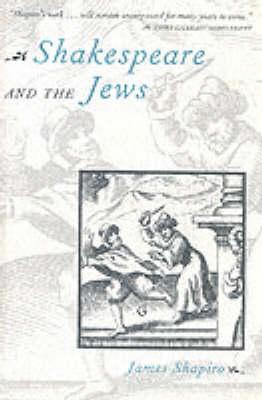Awards
- Winner of Roland A. Bainton Book Prize 2017
Overview
Going against the grain of the dominant scholarship on the period, which generally ignores the impact of Jewish questions in early modern England, James Shapiro presents how Elizabethans imagined Jews to be utterly different from themselves––in religion, race, nationality, and even sexuality. From strange cases of Christians masquerading as Jews to bizarre proposals to settle foreign Jews in Ireland, this book looks into the crisis of cultural identity in Elizabethan England and sheds new light on The Merchant of Venice.
Full Product Details
Author: James Shapiro (Columbia University)
Publisher: Columbia University Press
Imprint: Columbia University Press
Dimensions:
Width: 15.20cm
, Height: 2.20cm
, Length: 22.90cm
Weight: 0.482kg
ISBN: 9780231103459
ISBN 10: 023110345
Pages: 320
Publication Date: 04 September 1997
Audience:
Professional and scholarly
,
Professional & Vocational
Format: Paperback
Publisher's Status: Out of Print
Availability: Awaiting stock
 Language:
Language: English
Reviews
What Shapiro shows convincingly is how deeply Shakespeare's play dug into the fantasies, anxieties and pleasures of its audience. -- New York Times Book Review Shapiro not only explodes the myth of the absent Jew but, more significantly, explores how literature conveys such notions. -- Tikkun A groundbreaking study of Elizabethan anti-Semitism that offers a shockingly long pedigree for Shakespeare's Shylock. -- Kirkus Reviews
A groundbreaking study of Elizabethan anti-Semitism that offers a shockingly long pedigree for Shakespeare's Shylock. Shapiro (English and Comparative Literature/Columbia Univ.) takes on the accepted opinion that there were no English Jews and few resources in Shakespeare's era from which to draw the leading Jewish villain in The Merchant of Venice, arguing that even after their expulsion from England in 1290, Jews remained in sufficient numbers to represent the threat of both cultural and personal miscegenation. Testimony from the Spanish Inquisition offers references to postexpulsion Jews in British records, if only when they converted to Christianity or broke the law. Shapiro cites diaries, sermons, and political tracts documenting the British obsession with secret Jews, marranos from Iberia and false Christians, who somehow threatened a coalescing sense of Britishness. In the prevailing paranoia, Queen Elizabeth Tudor herself was accused of being a secret Jew. While no actual legislation has survived to confirm official government policy toward Jews, archival evidence proves that Tudor kings allowed small groups of Jews, who served as merchants, Hebrew teachers, and physicians, to remain in the country. Shapiro's case is solidified with an array of 16th- and 17th-century allusions to Jews (none positive or neutral) in Tudor and Stuart drama, backed up with gleanings from diaries, travel literature, and political, religious, and commercial tracts. All the vicious accusations, from desecration of the host to well poisonings and ritual murder, serve[d] both as threat and a confirmation of Christianity. Shapiro explores the pathology of these charges, but outside of his view of the pound of flesh as a reference to forced circumcision (or emasculation), there is little meat here for the Shakespeare scholar. Although not the Shakespearean study it professes to be, Shapiro's exhaustively researched work adds much to the history of anti-Semitism and to our understanding of xenophobia's role in the creation of the British psyche. (Kirkus Reviews)
Author Information
James Shapiro is Professor of English and Comparative Literature at Columbia University.




